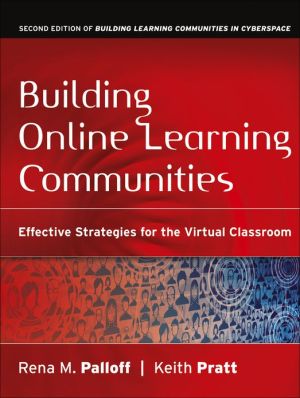Simulations and the Future of Learning: An Innovative (and Perhaps Revolutionary) Approach to e-Learning
"A compelling and deeply informative book that should be read by anyone who cares about the future of learning, and for those who seek to build a sustainable model."\ —Jonathon D. Levy, vice president, Online Learning Solutions, Harvard Business School Publishing\ "Insightful and instructive. Any organization that is serious about developing human capital must become serious about simulation. If you are serious about embarking on a simulation project within your firm, you should not do a...
Search in google:
Aldrich is an analyst, columnist, author, speaker, and consultant, and considered a leader in the field of e-learning. Written for trainers and educators, his text examines what needs to go into simulations to take advantage of their potential as an educational tool. Based on Aldrich's first-hand experience as a lead designer, the text tells the story of conceiving, designing, building, and marketing a new-generation educational simulation. From that experience, Aldrich assesses the challenges simulation developers and users will likely face in the future. Annotation ©2003 Book News, Inc., Portland, OR
\ Simulations and the Future of Learning\ \ \ \ An Innovative (and Perhaps Revolutionary) Approach to e-Learning\ \ \ \ By Clark Aldrich\ \ \ John Wiley & Sons\ \ \ \ Copyright © 2003\ \ Clark Aldrich\ All right reserved.\ \ \ ISBN: 0-7879-6962-1\ \ \ \ Chapter One\ \ \ In the Game\ \ Unlike the scripted, paper-driven exercises of\ the past, computer simulation has become a must.\ In fact, it may be the only way to represent the\ complexities of future warfare.\ -Lieutenant General Eugene D. Santarelli,\ Vice Commander, Pacific Air Forces, USAF,\ Air Component Support to Joint Exercises\ There's a joke I heard a while back. There is a small village, known\ across the country for their food and their mountains-and for their\ monthly lottery. The local school raffled quilts to raise money.\ One of the villagers, a woman named Greta, worked tirelessly\ for the poor. She made clothes and bread for the needy. She gave\ away every penny she ever earned.\ The thing she wanted most in the world was to win the lottery.\ It started off as whim. She thought how much better she would sleep\ with a nice quilt. Then it grew into an obsession. But month after\ month, year after year, she never won. And she grew bitter. She still\ did her work, but resentfully. Shewas often heard muttering angrily\ to herself as she delivered food. Every night before going to bed,\ looking at her shabby bed, she moaned up to the heavens, "I am your\ humble servant. I do everything I believe you want. All I ask is one\ thing. I just want to win the lottery once. Is that so much?"\ One night, a booming voice came down from the heavens. "Greta!"\ "Yes," she said, trembling.\ "Buy a ticket!"\ \ If You Want to Understand Simulations,\ Play a Computer Game First\ If you want to understand simulations, the only way to do it is to become\ familiar with today's computer games. Games are not educational\ simulations, of course. But they can introduce you to many of\ the structures, standards, and techniques built into simulations today.\ Understanding computer games is your ticket to win the lottery.\ (By the way, solitaire doesn't count. And it also doesn't count if\ you only watch someone else play a computer game; it may even\ count against you! You have to go through all of the experiences\ first-hand.)\ You will not always be impressed with what you experience, especially\ at first. Even the best games are terrible if judged by the linear\ standards set by television and movies. Computer games are\ typically full of blocky animation, clumsy dialogue, obvious production\ flaws, and melodramatic scripts.\ You will get past this.\ You will see that they actually redefine scalable experiences,\ adding breathtaking interactivity, and can convey extraordinary\ amounts of content. There is a reason why computer games are a\ $10 billion business today, and growing.\ For anyone who develops educational content, or modifies it, or\ purchases it, or teaches to it, or has a stake in his or her organization's\ learning strategy for long-term business results, understanding\ the interactivity and production values of a modern computer\ game experience is critical.\ If you aim too far below current games, you risk both boring\ your audience and missing out on effective ways to teach new types\ of skills. But if you aim too high above that mark (perfection or\ bust), you will either spend huge amounts of resources without any\ return at all or use that as an excuse to waddle on the sidelines.\ It is easy to know whether you need to brush up your experience\ with this new medium. If your computer has the W-A-S-D keys\ worn down, or you wake up in the middle of the night with a new\ strategy to play, feel free to skip this. You are already ready. But if\ you are shocked at the violence in Grand Theft Auto(r) III based on\ the clips shown on network news, or if you still think of computer\ games in terms of how goofy people look when they are playing\ them, you have some work to do.\ The first step is to make sure your computer is up to snuff. To\ play a current computer game, you will need a top-of-the-line computer\ circa turn of the century, namely a Pentium III (at least\ 300MHz), 32MB RAM, sound card, and a 3D accelerated graphics\ card or a Macintosh 2000 or later with OS 9.X or the newer OS X.\ If you do not have one, see if you have a friend who does. If none of\ your friends do, make new friends. Worst case, buy a new computer.\ It is the future of your organization-not to mention your career-we\ are talking about.\ \ Microsoft's Midtown Madness\ Start your education with one of Microsoft's Midtown Madness(r)\ games, preferably Midtown Madness(r) 2. It is a highly accessible\ game, with a very shallow learning curve. Choose the free-drive\ mode, and pick a car.\ You will find yourself on the roadways of a major city. There is\ nothing you have to do. There are no time limits or goals. This is\ just to play. Drive around. Drive on the road. Drive off the road.\ You will smash into the cars ahead of you. Get yelled at by pedestrians.\ You will lose control and sideswipe a bus. You will deliberately\ accelerate when a drawbridge is going up to see if you can\ jump it.\ Try following the traffic rules. Try breaking the rules. You will\ often get away with it if you do. This game is not politically correct.\ Try driving a few different vehicles, including the smallest car and\ the largest truck.\ When you are ready to move on, note what parts of the Midtown\ Madness experience are realistic and what parts are not. Also\ notice what aspects of driving reality are captured well, for example,\ the mass of the vehicle with regard to steering, speed, and\ jumping. Also identify what aspects are not captured, such as fuel\ consumption.\ You can drive seemingly anywhere in Midtown Madness, even\ into shop windows. But to get in the habit of observing what makes\ a game tick, also look for the boundaries of Midtown Madness as\ you play. They use water, buildings, and rotaries cleverly to keep\ you from going in one direction, say north, indefinitely.\ While not a perfect game, Midtown Madness is a great first exposure\ to computer games. It epitomizes a sense of experimentation,\ playing off of our own "real-world" experience. It will be entertaining\ and worth playing for about an hour.\ \ Roller Coaster Tycoon(r)\ Next, try RollerCoaster Tycoon(r) (or, again, the ever-so-slightly\ better sequel, RollerCoaster Tycoon 2(r)). In this game, you try to\ develop land into a successful theme park. You can place rides and\ paths anywhere you want. You can set prices. You can manage\ your staff. You have to meet the needs of hundreds of simulated\ customers.\ Go to any of the starting scenarios. Log in a few hours of playing,\ and then spend a few minutes sizing up the experience.\ The first hour with any new computer game (or, for advanced\ players, a new computer game genre) is pretty confusing. You don't\ know what you are doing. You make huge mistakes. Things are happening\ on the screen for no obvious reason. You want to do something\ simple, but you don't know how. Or you are constantly being\ told why you can't do things. The interface seems twitchy and over-sensitive.\ The experience seems blocky, rough, and off-putting. It is\ like learning a new operating system.\ Then things start to make sense. You are in the zone. In Roller-Coaster\ Tycoon, you actually feel like the builder of an amusement\ park. You start to worry about customers. They need change; they\ need new experiences. You get excited when your research team has\ produced a new ride. You start playing with admission prices. You\ hire some full-time mechanics to make sure your equipment is running\ smoothly.\ After you are comfortable with the interface and the game play,\ try to win some of the early scenarios. Try to build an amusement\ park that brings in a certain number of customers at a certain satisfaction\ level. You will probably not do it the first few iterations.\ And I predict you will feel frustrated. When you do, walk away.\ Do something else. Come back in a few hours and try again. Or\ sleep on it. In most cases, when you try again, you will succeed.\ That's good. Frustration, and then getting past it, is probably necessary\ for learning.\ Soon relationships become obvious. It seems inconceivable that\ you didn't understand it the first time around. If you were a power\ gamer, you might go to a website where people swap strategies. Use\ Google to try and find one if you want.\ If you build two or three parks, they will probably be more\ similar than not, that is, the modifications will be relatively minor.\ Now watch someone else play. He or she will build a park in ways\ that you never even considered. You know you are thinking too linearly\ if you keep trying to correct what the other person is doing!\ You don't need to become a great Roller Coaster Tycoon player.\ Just win one of the easy scenarios, and it is time to move on.\ \ The Sims(tm)\ The next game to install is The Sims(tm). Go through the mini-tutorial.\ Build a house. Buy things. See what happens.\ A few aspects of The Sims will strike you almost immediately.\ The first is how incomplete and rudimentary the game seems. The\ Sims don't talk, they mumble. The situation doesn't feel realistic\ at all. A day goes by too quickly to accomplish everything you\ need to. Cleaning the house is a drag. The interface feels confusing\ and you have trouble figuring out what to do to make things\ happen.\ The second thing to notice is how much fun it is. Earning money\ and improving the quality of your simulated life is extremely rewarding.\ You can decorate your house the way you always wanted\ to or experiment with furnishings that in real life have been ruled\ out by your inherent good taste. You can buy expensive toys like a\ huge plasma television. You can flirt shamelessly with your neighbor's\ spouse. You can sleep late and invite friends over instead of\ going to your job.\ You will soon understand why The Sims is the bestselling computer\ game of all time. You may even be able to reflect a bit on your\ own life. Time is a precious commodity. There is never enough of it\ to do everything you want. Meeting multiple goals at the same time\ (such as comfort and entertainment) is necessary. Even articulating\ a set number of goals and trying to meet them is more than most of\ us successfully accomplish.\ \ Beyond the Open End\ Midtown Madness, RollerCoaster Tycoon, and The Sims are open-ended\ games. There is no story, save the one you make up around it.\ To finish your early exposure to computer games, I would recommend\ you play one game that is linear (at least in a computer\ game sort of way). Pick a game where you play highly defined characters.\ These games are often from the genre First-Person Shooters,\ because the action takes place around, and from the perspective of,\ a consistent character that you control.\ If you can stand the carnage, try a few hours of Max Payne(tm).\ This is a highly stylized, highly emotional experience. You will get\ to know the title character very well. You will know his voice, how\ he moves, and his motivation. You will witness cinematic "cut-scenes"\ that move the story along. You will find yourself in huge,\ meticulously crafted sets that would impress George Lucas.\ If you want something lighter, try Star Trek Voyager(tm): Elite\ Forces. You will play an extended episode derived from the science-fiction\ television show. You will interact with computer versions\ (so-called avatars) of the main characters from the show. There are\ plot twists. You will take breaks between the action to get the background\ story. You will be surrounded by a well-defined supporting\ cast (newly created for the game) and overhear their conversations.\ If you don't protect them in a firefight, they will die.\ If you can tolerate an experience that is dark, violent, and brooding,\ try Deus Ex(tm). This may be a perfect computer game. It both\ gives you a highly structured story and the ability to play it on your\ terms. If you want to evolve your character into a sneaky James\ Bond type, you can. If you want to evolve your character into a\ Terminator-like creature, you can. You can make a thousand decisions\ along the way to make your onscreen character reflect how\ you want to play the game. You can choose stealth over brute force.\ You can scavenge or you can buy. You have to prioritize which tools\ to bring along and which to leave behind. On top of that, most of\ the challenges can be solved in different ways as well. Deus Ex gives\ you a nearly open-ended environment that encourages you to be\ creative and rewards your deviousness.\ \ Into the Simulation Age\ Spending $100 on games and putting in five to ten (to twenty)\ hours to increase your own awareness of how they work and why is\ absolutely necessary to understand this book and understand educational\ simulations broadly. It will be hard. And it will be exhilarating.\ You have to be a student, and a pathological learner. Buy\ guides if you want, but do not use them instead of experiencing the\ game yourself.\ There once were newspaper people who criticized television for\ being too superficial. There were railroad executives who disparaged\ airplanes as being too expensive. They rejected electronic journalism\ and air transportation because they were comfortable with their\ world. Playing a couple of computer games is not sufficient, of\ course, to get you out of your comfort zone and immediately involved\ in creating or championing simulations for your organization's\ e-learning arsenal. But it is the lottery ticket that you must\ buy if you want a chance to contribute in the future.\ (Continues...)\ \ \ \ \ \ \ \ Excerpted from Simulations and the Future of Learning\ by Clark Aldrich\ Copyright © 2003 by Clark Aldrich.\ Excerpted by permission.\ All rights reserved. No part of this excerpt may be reproduced or reprinted without permission in writing from the publisher.\ Excerpts are provided by Dial-A-Book Inc. solely for the personal use of visitors to this web site.\ \ \
ForewordAcknowledgments1Do You Want Fries with that e-Learning?1Pt. 1The Simulation Way2In the Game133The Primary Colors of Content234The e-Learning Arms Race315The Myth of Subject-Matter Experts376The Search for Content457What Would a Leadership Situation Look Like?578Uncovering the Essence of Leadership719The Lure of Linear Content85Pt. 2Modeling Reality10Rules for a Post-Textbook World: Simulation Design Principles9711The Beginning of Open-Ended Content: Sets and Figures10512What Do People Do All Day? The Animation System12113The Ultimate Hurdle: The Dialogue System12914Modeling a Little World: The Physics System15115Modeling the Inhabitants: The AI System159Pt. 3Philosophical and Technical Realities16A New Look at Work: The Interface System17317The Scariest Word of All: Gameplay17918Why Use Grades, Anyway? Metrics, Scores, and Simulations18719Virtual Leader vs. the World199Pt. 4The Way Ahead20Seventeen Simulation Issues21121A Manifest Destiny: Simulations and the Training Industry221Epilogue: Looking Back at Schools229Glossary237App. 1Raw Leadership Content247App. 2Organized Leadership Content257Index269About the Author281Pfeiffer Publications Guide283
\ From the Publisher"Clark Aldrich…has written a book that will revolutionize e-learning in both education and industry." (Human Resource Development Quarterly, vol. 15, no. 2. Summer 2004)\ "Clark's book is a delight." (Training Media Review, 5/10/2004)\ \ \








